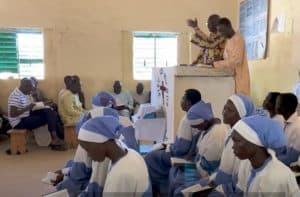When our kids were little, the ‘greatest hits’ in the Sharp family playing list were a series of cassette tapes called ‘GT and the Halo Express’. The best thing about them was that they included songs with Bible verses straight out of the NIV translation so we all memorized Scripture as the kids listened to them over and over.
One of the songs that stands out in my mind came from Hebrews:
Therefore, since we are surrounded by such a great cloud of witnesses, let us throw off everything that hinders and the sin that so easily entangles. And let us run with perseverance the race marked out for us (Hebrews 12:1 NIV).
I have a lasting image of my daughter Aimée singing that song, bouncing up and down on a tree branch over the roof of our village house in Chad. In a sense, it has become the ‘theme song’ for our involvement with the translation of the Gergiko New Testament. But we didn’t run; we plodded.
If you had told me, in 1992 when we relocated to the village of Mukulu in central Chad, that it was going to take us 27 years to finish the translation of the New Testament, I may not have been too surprised. We began at the same time as other language teams who finished in 20 years, and we were still trudging through it.
During the years we lived in the village, a young lady from the peace corps was assigned to Mukulu. She once asked us, ‘What makes you stay?’ I told her that it was the love of Christ, and the love for the people he called us to. It makes all the difference. Our aim was to put the Gergiko New Testament into the hands of the church, and that goal kept us going during very difficult times.
In my mind, the culmination of our work would be the big ‘D’ day: Dedication day! I couldn’t wait! But what if that day didn’t come? What if we went to Chad for it, along with seven visitors from Australia and two from the USA, and the New Testaments didn’t arrive in time? Well, the truth is that they didn’t! We had a small celebration–happy as it was–but not at all what we had imagined. 
All we and the Mukulu church can put it down to is that the battle is fierce because some amazing things are happening at a village level. The church has grown so much, even without the New Testament, that they’ve created three satellite congregations. Women in villages on the other side of the mountain have taken literacy classes so they can read the New Testament when it arrives. People one would never imagine are coming to the Lord through dreams. The chief of the Mukulu people commented to our visitors that having mother-tongue literacy classes for pre-schoolers means that children who attend them are at the top of the class when they get to school.
When we first moved to the village in 1992, there was a group of elderly ladies at church who always sat at the same bench; leaning on their walking sticks it appeared they’d gone to sleep. At that time, all the Scripture readings were in French. One Sunday when I was sitting right behind them, one of the translation team members read from the Gospel of Mark in Gergiko. The ladies sat up and got really animated, chatting among themselves! A lady sitting next to me laughed with me and said, “They understood!”
I was so glad I witnessed that because it gave me perseverance to finish the task. Those ladies have passed away, but at the celebration we had in January I got to dance with some of the new generation of elderly ladies, bringing it full circle.
We could easily get discouraged because the second attempt at a dedication was postponed indefinitely by COVID-19. Our main regret is that the New Testaments aren’t in the hands of the people yet. But the Lord has had a plan for the Mukulu people all these years, and He’s not finished yet. He is the author and finisher of our faith.
Story by Elly Sharp
Source: wycliffe.org.au

